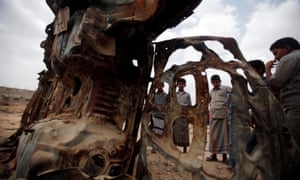Obama's drone war a 'recruitment tool' for Isis, say US air force whistleblowers
Four former service members – including three sensor operators – issue plea to rethink current airstrike strategy that has ‘fueled feelings of hatred’ toward US
Four former US air force service members, with more than 20 years of experience between them operating military drones, have written an open letter to Barack Obama warning that the program of targeted killings by unmanned aircraft has become a major driving force for Isis and other terrorist groups.
The group of servicemen have issued an impassioned plea to the Obama administration, calling for a rethink of a military tactic that they say has “fueled the feelings of hatred that ignited terrorism and groups like Isis, while also serving as a fundamental recruitment tool similar to Guantánamo Bay”.
In particular, they argue, the killing of innocent civilians in drone airstrikes has acted as one of the most “devastating driving forces for terrorism and destabilization around the world”.
The letter, addressed to Obama, defense secretary Ashton Carter and CIA chief John Brennan, links the signatories’ anxieties directly to last Friday’s terror attacks in Paris. They imply that the abuse of the drone program is causally connected to the outrages.
“We cannot sit silently by and witness tragedies like the attacks in Paris, knowing the devastating effects the drone program has overseas and at home,” they wrote.
The joint statement – from the group who have experience of operating drones over Afghanistan, Iraq and other conflict zones – represents a public outcry from what is understood to be the largest collection of drone whistleblowers in the history of the program. Three of the letter writers were sensor operators who controlled the powerful visual equipment on US Predator drones that guide Hellfire missiles to their targets.
They are Brandon Bryant, 30, who served in the 15th Reconnaissance Squadron and 3rd Special Operations Squadron from 2005 to 2011; Michael Haas, 29, who served in the same squadrons during the same period; and Stephen Lewis, 29, who was with the 3rd Special Operations Squadron between 2005 and 2010.
The fourth whistleblower, Cian Westmoreland, 28, was a technician responsible for the communications infrastructure of the drone program. He served with the 606 Air Control Squadron in Germany and the 73rd Expeditionary Air Control Squadron in Kandahar, Afghanistan.
The four are represented legally by Jesselyn Radack, director of national security and human rights at the nonprofit ExposeFacts. “This is the first time we’ve had so many people speaking out together about the drone program,” she said, pointing out that the men were fully aware that they faced possible prosecution for speaking out.
In the wake of the Paris attacks, Obama has stuck firm to his determination to avoid sending large numbers of US troops to Syria, beyond the limited engagement of special forces. The natural, though unspoken, consequence of such a strategy is a deepening reliance on aerial attacks in which unmanned drones increasingly play a leading part.
The number of lethal airstrikes has ballooned under Obama’s watch. The Pentagon has plansfurther to increase the number of daily drone flights by 50% by 2019.
From its inception, the drone program has been troubled by reports of mistaken targeting. Classified government documents leaked to the Intercept revealed that up to 90% of the people killed in drone strikes may be unintended, with the disparity glossed over by the recording of unknown victims as “enemies killed in action”.
In one of the most widely publicised errors, the US government was accused by one of its own officials of making an “outrageous mistake” in October 2011 when it killed the US citizen Abdulrahman al-Awlaki, the 16-year-old son of Anwar al-Awlaki, an al-Qaida leader who was also a US citizen and was killed by a CIA drone two weeks previously.
One of the four drone operators who signed the letter to Obama, Brandon Bryant, was part of the team that tracked Anwar al-Awlaki by drone for 10 months shortly before he was killed. In an interview with the Guardian, Bryant said that he was not opposed to drone technology per se, which he saw as having beneficial uses.
“We just understand that in its current form the program is being abused, there’s no transparency, and we need to be open to other solutions.”
Bryant said that in his view he had been made to violate his military oath by being assigned to a mission that killed a fellow American. “We were told that al-Awlaki deserved to die, he deserved to be killed as a traitor, but article 3 of section 2 of the US constitution states that even a traitor deserves a fair trial in front of a jury of his peers.”
Two of the four drone operators have also spoken out in a film about the US program, Drone, that premieres theatrically in New York on Friday. The other two are going public for the first time, having just come forward in the past few weeks.
Obama this week made clear that he would continue to resist putting more boots on the ground in Syria following the Paris attacks. Speaking at the G20 summit in Turkey, he said “part of the reason is that every few months I go to Walter Reed [military hospital] and I see a 25-year-old kid who is paralysed or has lost his limbs, and some of those are people who I have ordered into battle”.
But the former drone operators argue that the strategy is self-defeating, as the high number of civilian casualties and the callousness of drone killings merely propagates anti-US hatred. “Right now it seems politically expedient,” said Cian Westmoreland. “But in the long term the bad side of a Hellfire missile and drones buzzing overhead is the only thing that a lot of these people know of the United States or Britain.”
Bryant accepted that there was no negotiating with extreme, violent terrorists of the type that carried out the Paris attacks. “But you have to prevent such people being created,” he said. “We validate them, we keep this cycle going. Their children are afraid to play out in the sun because that’s when the drones are coming.”
http://www.theguardian.com/world/2015/nov/18/obama-drone-war-isis-recruitment-tool-air-force-whistleblowers
For more details on the subject of drone warfare, see :
"The Drone Papers" in the Intercept
https://theintercept.com/drone-papers/
For more details on the subject of drone warfare, see :
"The Drone Papers" in the Intercept
https://theintercept.com/drone-papers/


Geen opmerkingen:
Een reactie posten
Opmerking: Alleen leden van deze blog kunnen een reactie posten.